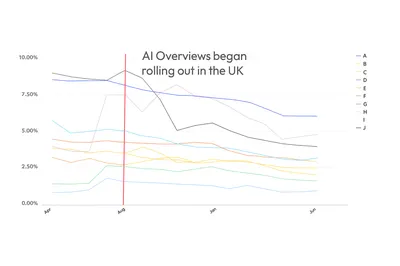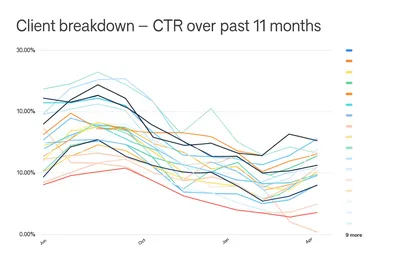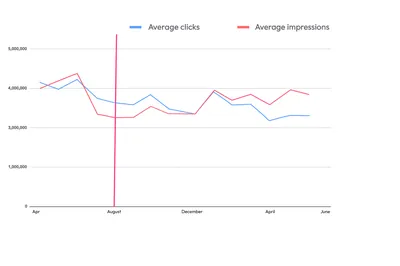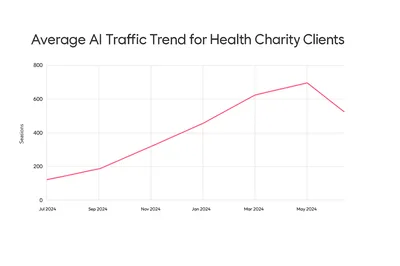How AI is reshaping search for health charities
We recently held a webinar exploring how AI is changing the search landscape and what it means for health charities.
In this post, we share our research, findings, and examples from our client work, along with practical ideas for how your organisation can respond.
A big thank you to everyone who joined us, it was a lovely, engaged audience with plenty of great questions, and to Lisa and Emma for hosting and guiding the Q&A. If you missed it, you can watch the full recording at the end of this post.
The rise of AI-powered search
Google has been moving towards AI-generated search results since 2023, with a steady rollout of features that are reshaping how information appears in results pages. AI Overviews launched in the US in May 2024, reached the UK in August, and have since made a big impact on health charities.
We’re seeing impressions (or views in search results) rise because AI Overviews typically surface a greater number of sources than traditional search results. However, click-through rates are falling, as more users find what they need directly on the results page. Health content is particularly susceptible because people often search for quick answers – exactly what AI Overviews provide.
This trend is consistent across both organic search and Google Ad Grants traffic, showing the impact isn’t limited to one channel.

Sitewide click-through rate trends from Google Search across our health charity clients

Google Ad Grants impact

Sitewide traffic trends across our health charity clients’ organic traffic
What triggers (and doesn’t trigger) AI Overviews
Our research on NHS content found:
- Around 70% of condition-related terms (e.g. symptoms, causes, treatments) trigger AI Overviews.
- In the UK, only around 15% of medicine-related queries trigger AI Overviews – a big contrast with the US.
- Interactive tools like BMI or due date calculators rarely trigger them, because AI can’t deliver the personalised calculation itself.
Understanding patterns in how you appear in AI Overviews can help you prioritise the content that is most likely to bring clicks to your website.
The “forum renaissance”
Alongside AI Overviews, forum content is becoming more visible in Google results. This began with the “Discussions and Forums” rich result in 2022 and has accelerated with Google’s expanded partnership with Reddit.
If your charity runs a forum, this is an opportunity to:
- Consider where your forum appears alongside your website content and how this feeds into your community’s journey.
- Improve internal linking between your forum and website.
- Use top-performing forum posts to identify evergreen content gaps.
Google Search Console now reports on performance for “Discussions and Forums” results, so you can track this visibility.
Beyond Google search: the growth of social search
Typically, when we talk about SEO, we see it as synonymous with Google. But with the change in search behaviour, people are using different mechanisms to find the information they need.
Over 80% of people aged 18-49 now seek health information on social media, and 38% of people do not view their doctor as a ‘regular information source’ and are more likely to turn to online influencers instead. Though this is a concerning statistic for the clinical risk of health misinformation, it makes it clear that there is a distinct need for trustworthy, authoritative voices on organic social platforms that are easily found via social search.
Google is adapting by pulling short-form video from TikTok, Instagram, YouTube and Facebook directly into search results - and Instagram is also making public posts discoverable via search engines.
This makes organic social a key part of a modern search strategy, especially as paid social becomes harder for health charities due to Meta’s advertising restrictions.
SEO teams should work closely with social teams to align on topics, keywords, and messaging. When publishing video content, optimise descriptions and captions to match how people search.
Alongside these changes, we’ve also noticed Google actively promoting its own search services across social platforms. We’ve seen a variety of ads using messaging like “Search like never before” with a spotlight on features such as image-based search. To us, this signals Google’s effort to reassert its position as the go-to destination for answers.
Large language models (LLMs) and trust
Tools like ChatGPT, Claude, and Gemini are increasingly being used to find health information, and a 2024 study found that people exhibited higher levels of trust in ChatGPT than Google for health information.
The graph below shows the average AI traffic trend for a sample of our health charity clients - this looks at the referral sessions from ChatGPT, Claude, Bing, Google and Gemini. This shows that over the last 12 months, there has been a real increase in traffic, which peaked in May. In June, this has seen a decrease, which could potentially be seasonal due to the summer months.

Average AI traffic trend for health charity clients
This data doesn’t show the traffic you might be losing to AI sources, or instances where your charity is named in an AI response but not linked. For example, you might try asking ChatGPT a question where your organisation is mentioned and linked, but we cannot see when a user decides not to go to your site.
Because this is still such a new space, we’re seeing a surge in ads and LinkedIn posts promoting “AI SEO tools” that claim to track where you’ve been mentioned but not linked, or estimate traffic you’re missing out on. Our SEO team is currently investigating possible options we can use with our clients, but in the interim, we will be treating these claims with caution.
What you can do is track the traffic you’re gaining from AI sources. You can see the landing page, the referring AI tool, and the number of sessions. We report on this monthly for some of our clients, giving us useful trend data on the types of content proving most valuable in LLMs.
Cross-team collaboration
One of the biggest opportunities in adapting to AI-first search is breaking down silos. The best results come from close collaboration and information sharing between teams like SEO, content, community, digital, helpline support (such as nurses) and subject matter experts.
For example, if Nurses can feed back to the website team if there’s been an increase for a particular question, that could be a clear indicator that there’s a topic gap on the website.
Regular check-ins and shared reporting help keep everyone aligned, so search activity feeds into wider organisational goals rather than sitting in a silo.
Final thoughts
It’s important to remember we’re all facing this together - the majority of our health clients have been impacted by AI-powered search and the changes in the way that people are searching.
We would encourage you to have internal discussions within your organisation (perhaps through a working group) to create a unified strategy to respond to any changes or challenges.
Start by asking:
- Do we want our content to appear in AI-generated answers?
- How will we measure success if impressions rise but clicks fall?
- What value can we provide that AI can’t? What tools or services can we promote?
- How do we bring teams together to cover all the ways people search?
Adapting your SEO strategy:
- Prioritise queries without AI Overviews – these still have higher click-through potential. We recommend looking at Google Search Console and spot-checking the search results in incognito mode.
- Create content AI can’t replicate – such as calculators, personalised assessment tools, or service finders.
- Integrate forum and social insights into your SEO planning – the most active conversations can help to guide your content calendar.
Looking for further support?
We’re offering two focused audits to help you understand where your audience is increasingly looking for health information, and how to meet them there.
Forum discovery audit
- Analysis of user search queries for your forum to identify gaps/opportunities.
- Linking opportunities between high-volume forum threads and your main website.
- Search appearance optimisation for key forum categories and landing pages.
Social search audit
- Evergreen content opportunities for YouTube, YouTube Shorts, TikTok and Instagram based on user needs.
- Competitor analysis on social search channels for key evergreen topics.
- Content gap identification where there's proven searcher demand.




